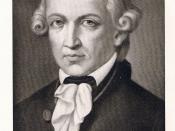Fatma Nur Koçak 21001447 PHIL244-2 Essay 1st Question: Case Evaluation: 12 Years a Slave
In the book "Groundwork for the Metaphysics of Morals", Kant questions the morality of an action. He questions the moral bases of actions as well as how one should behave according to which principles. His ethical theory is based on the duty principle which is basically based on the argument that what makes an action good or bad is the intention, in other words the good will, behind it. An action is good or morally wrong if the action is made by the good will. An action is bad or morally wrong if the action is made by bad will or not good will. The consequence of the action is not regarded, main point is the intention. This intention is born by the duty which is a collective summary of human reason. Whether the consequences harmful or good for the society, if one act is duty, one should act in the certain way without considering the end.
Ultimate goal is following the duty. Kantian ethics frame that how people should act with which motivation. The duty principle he argues has both pros and cons in terms of universality. On the one hand, consistency in the following duty is the pro part of the theory; on the other hand, absolutist standing and too narrowed point of view are the cons of the Kantian ethical theory.
Concurrency is one of the strong principles Kantian ethic follows. The base of the Kantian ethic is the going after the duty consistently. The given worth to an action comes from its accordance with the duty one has. There are two kinds of duties, perfect and imperfect duties. It is people's duty to never tell a...


